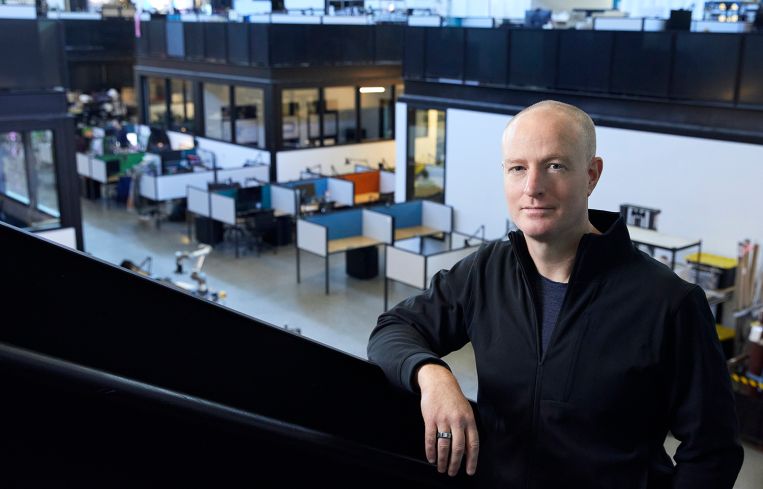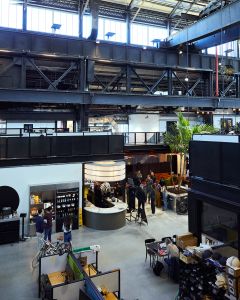Newlab CEO Cameron Lawrence On What’s New at the Tech Accelerator
The Brooklyn Navy Yard incubator is also a growing investor in proptech and other technologies
By Philip Russo January 15, 2024 8:14 pm
reprints
If an incubator, accelerator and investment platform boasting more than 200 tech startups can be said to operate under the radar, the Brooklyn Navy Yard-based Newlab might fit the description.
In August 2023, Cameron “Cam” Lawrence was brought on to be the COO of Newlab. However, his extensive entrepreneurial experience and stated desire to combat global warming through technological development quickly advanced him to the organization’s CEO role.
In the first week of January, Lawrence spoke with PropTech Insider about how proptech startups are an important cohort within Newlab, and why he thinks early-stage deep tech and climate tech venture platforms like Newlab are vital for startups and local economic development.
The interview has been edited for length and clarity.
PropTech Insider: You have taken an unusual path to Newlab and tech innovation. How did that come about?
Cam Lawrence: I will say I’ve had a unique career. I’m actually from Vancouver. I started my career on a CPA path with PricewaterhouseCoopers and had the opportunity to work in a whole host of different industries across the economic spectrum, in Canada as well as in the U.S., including Boston. From there, I pivoted into the life sciences space and into oncology in particular for a large publicly traded oncology company. So I went through a process of a number of large financings and partnering deals to move cancer therapeutics, which was obviously very rewarding. That was my first foray into mission-driven work, if you will.
From there, I spent a number of years in the commerce space with a publicly traded company that I successfully sold to Staples a number of years ago. Then I ended up getting recruited to come to Pittsburgh to help turn around GNC, the health and wellness retailer. My having a background in e-commerce turnarounds, as well as the life sciences industry, made me a very interesting target for them. So going through that process helped turn that company around successfully.
But I’d always wanted to play a role in the climate crisis, helping to address it. As someone that doesn’t come from a science or engineering background, it was hard for me to find the right opportunity to deploy my talents in a way that can have a meaningful impact on, quite frankly, saving life on Earth. Until I came across what we do here at Newlab.
And what exactly is Newlab?
What I found at Newlab is this opportunity — call it a venture platform — but, really, what we do is we help early-stage deep tech and climate tech founders build their business from being in the community that they call home. What we have here in the Navy Yard is 70,000 square feet of not only the workspace, but also the capital infrastructure to help these early-stage founders develop their products and prototypes. One of the biggest challenges for early-stage companies is having access to the equipment that is otherwise cost prohibitive for them, to be able to develop a prototype. We help them by giving them a home and community, but we also have a fairly significant consulting business.
And the role of that is bringing in some of the world’s most reputable large corporations that are looking for early-stage companies to solve climate-related issues that are relevant. We work with large companies to scour the globe and look for those types of partners. Then, for the startup, that actually creates their first commercialization event, their proof of concept and validation on a commercial scale. That’s massively impactful for the founders. Then there is the capital piece, being able to help capitalize these early-stage companies. We will make investments into the ones on which we feel like we can have an outsized impact.
So Newlab is a platform that helps provide community to develop your prototype, have your first commercialization event, and access capital.
Along with your desire to positively affect climate change, what was it at Newlab that made them interested in you as being the new CEO?

Great question. I joined the company in August originally as COO, and then I was moved into the CEO role shortly thereafter. I think I have a unique experience in a lot of ways, helping earlier stage companies scale up and also working with large companies and helping them be more entrepreneurial. That’s really what I’ve done in my career.
So, I think from the Newlab perspective, bringing in a leader that understands how to grow smaller companies, but also who knows what good looks like at a global scale. Also, someone who can actually work with the type of industry partners that we have in our ecosystem.
Newlab is a for-profit incubator and accelerator that invests in startups, but how has it raised its investment fund? Is it public, private, or both?
It comes in the form of public money, as well as private money that has come from benefactors. We recently opened in Detroit, with Michigan Central, a very significant facility there. And we’ve gone from zero to I think it’s over 80 companies that call Newlab home in Detroit. We’ve been able to demonstrate building an ecosystem in that situation, as well as here in Brooklyn. It involves individuals that are extremely focused on helping build these local ecosystems to support the type of innovation that I think we all want to see in the cities that we live in, as well as the public money to help make that happen.
Detroit is a great example. We’re basically helping create a local clean-tech ecosystem focused on mobility in Detroit, which is critically important to that city. It’s less about a return for them than it is about the job creation and the creation of these local economies. On top of that, like every other for-profit company, we do have investors that have been invested in the vision of what we’re trying to scale and build in terms of long-term profitable growth.
On the public side, where are you looking for funding going forward?
Right now in this country we have a unique opportunity, especially in climate, because there’s an awareness of the challenge that we’re facing on a global space scale. Funding that is trickling down to organizations like mine through acts such as the Inflation Reduction Act — that make access to capital a possibility for us. We do leverage that, but it also takes individual and private organizations to help support building what we’re building as well.
Can you talk about what your current capitalization is?
We’re private so I’m not going to get into the specific dollars, but our investors have historically been, you know, high-net-worth friends and family offices that deeply care about our mission as well as earning a strong return from their investment. Having been someone who has had a career in numerous industries, I will say that being tied to an initiative that is so critical for the survival of our species has made my life easier in terms of finding people that get it and want to invest in being part of the solution.
How does your investment strategy at Newlab affect what you see as the opportunities in proptech investment?
We’re very focused on deep tech and climate tech, which does touch on proptech in a number of different areas. Ultimately, we’re looking for early-stage companies, but in terms of deep tech and climate tech, we’re really focused around key themes — energy mobility and materials in particular.
As to how that relates to property tech, I would say that pure property tech is only a couple of percent of our membership base. But when you think about decarbonization of physical premises as a broader technology, then it gets a lot more significant.
For example, one of the companies that we supported in Detroit is a company called Pearl Electric. They’re focusing on building a platform that can help the estimation process for putting in solar panels and other decarbonization technologies into homes, because the biggest problem right now isn’t that we don’t have the technology to make your home more efficient, it’s finding the contractor who will come in, give you a timely quote, and then do the work. Pearl Electric is trying to streamline that process to get a pre-quote in place before the contractor even has to show up so the contractors are not wasting their days. Those are the types of companies that we help support.
So, maybe not pure proptech, but very much in the property decarbonization realm, which within the broader proptech concept, including the EV space, is more significant. Our support of Itselectric here in Brooklyn is a great example. There’s a number of those kinds of companies that obviously are working directly with property owners and property managers to help decarbonize the planet through their product. It is becoming a more material aspect of the communities that we build.
Do you have any other proptech startups in Brooklyn that fall into that realm at Newlab?
We have a company called Teknobuilt, which uses AI to speed up the construction process for general contractors. They’re doing really well. We have another Brooklyn-based company called Renovate Robotics, that uses a cable-driven robot to install shingles and solar panels on residential homes. This is the best part of my job because you find so much inspiration in the founders and what their missions are.
Overall, how many startups are currently at Newlab?
We have over 200 that call Brooklyn home. In Detroit, we’re over 80, growing from zero in April 2023. There are stakeholders like the city of Detroit, for example. Their key performance indicator is how many amazing companies can we build and how many jobs can we create? The answer for us is we can go from zero to 80 in less than a year, literally. That has a huge amount of value for those local ecosystems and that opens up the coffers of other geographies that we can grow and help build these types in as well.
Do your corporate partners help Newlab source its startups? How does that process work?

It’s mainly the other way around. We typically work with industry partners like Verizon or Ford, and we almost act like a continuation of their strategy arm or their business development arm. They’re looking to us for our ability to source startups that are really relevant. That could be acquisition targets, they might be investments for them down the road. They might be suppliers for them down the road.
But our ability to bring these startups with extraordinary potential to the large industry partners, design pilots with the industry partner, and have the startups demonstrate their technology at scale becomes extremely valuable for the industry partners that we serve.
Do you have relationships with the New York real estate industry, as well?
We do. Given the nature of what we’re building, this is relevant for large landlords as well. The CBREs of the world are interested in Newlab because we can be the center of gravity in the development of a local cleantech, deep tech and proptech ecosystem. We’re part of the solution for them. So we actually play at a very interesting intersection between these various different stakeholders.
Philip Russo can be reached at prusso@commercialobserver.com.



